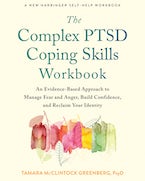By Tamara McClintock Greenberg, PsyD
Angry clients are common for those of us who see people with trauma histories. Although anger is included in the criteria of post-traumatic stress disorder (PTSD), between 1987 and 2011, only about 1.4–1.5 percent of research articles on PTSD looked at the role of anger and hostility.
Clients who have predominant angry states can be hard to help. Anger is often combined with states of suspiciousness, which puts us in a perilous condition as supposed helpers.
Angry clients often:
- Question the value of therapy
- Can be demanding of us
- Can seem to blame everyone else for their problems
- Can imply that we are incompetent
One of the most important things about helping angry clients is to try to get inside what their experience is. Why are they so angry? We need to try to understand and employ creative techniques to soften hostility.
One technique to try is to help clients realize that anger is just one side of the fight/flight response. Sometimes clients can realize that fear is part of their anger as a way of feeling a sense of control. When we can explain autonomic responses to trauma, it can help some understand their fear of vulnerability.
However, some cannot achieve that. In these situations, we need to remember the importance of a strong treatment frame. By this I mean not letting a client be abusive, and having clear limits on what you will tolerate.
Other techniques to try are:
- Anger management
- Developing behavioral game plans on how to talk with people they are mad at
- Considering that anger may be linked to a sense of over-responsibility; listen for cognitions of irrational causality or grandiosity
- Remind clients that only angry actions can hurt others, not angry thoughts
Tamara McClintock Greenberg, PsyD, is a clinical psychologist and renowned expert in the treatment of depression, anxiety, trauma, and more. Her work has been published in HuffPost, Psych Central, Psychology Today, the San Francisco Chronicle, and she has been featured in Forbes, USA Today, Newsweek, Next Avenue (PBS), and The Washington Post. She has also been interviewed by major radio stations, including KQED’s Forum.



 2024 Peace Playbook: 3 Tactics to Avoid Clashes with Your Partner
2024 Peace Playbook: 3 Tactics to Avoid Clashes with Your Partner